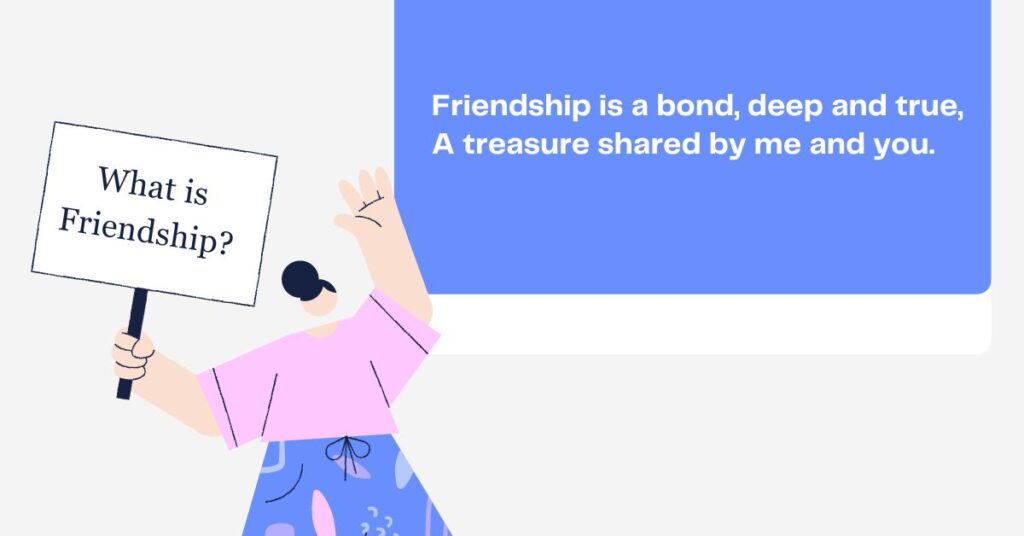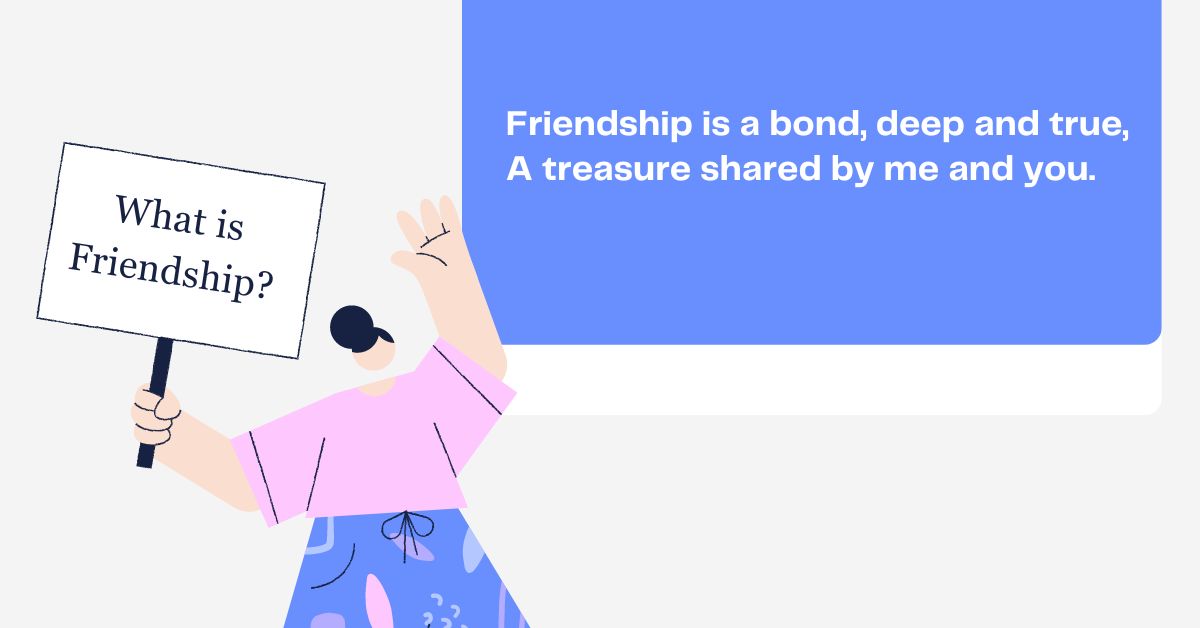“A real friendship walks in when the rest of the world walks out.” – Walter Winchell
Friendship is a treasure that enhances our lives in innumerable ways because it is an enduring tie that transcends space and time. Since the dawn of time, friendships have played a crucial role in every aspect of human life, from the playgrounds of infancy to the workplace, social gatherings to the virtual world. However, we frequently fail to see the tremendous value of this priceless link amid the confusion of modern life. In this blog, we’ll look at what friendship really is and why it’s still one of our most treasured and essential bonds.
What is Friendship?

There is more to friendship than a passing acquaintance or the number of likes on a social media post. It is an intense bond between two people that is based on respect, empathy, trust, and understanding. Genuine relationships endure hardships and the test of time, getting stronger daily.
- Mutual Respect: Friends respect one another’s ideas, limits, and differences.
- Trust: Trust is the foundation of friendship since it allows people to confide in one another without fear of being judged.
- Support: Friends offer emotional, moral, and even practical assistance in both good and difficult times.
- Shared hobbies: Common hobbies and activities improve friendships and allow for meaningful encounters.
- Communication: A healthy friendship requires open and honest communication.
- Empathy: Friends understand and share one other’s emotions, expressing empathy and compassion as required.
- Fun and enjoyment: Friendship frequently entails sharing laughs, participating in activities together, and making lasting memories.
- Acceptance: Friends accept each other as they are, including their flaws and defects.
- Longevity: Some friendships are lifelong, while others are more fleeting, yet all may be significant and powerful.
- Exchange: Friendship is a two-way street in which both sides give and profit from the connection.
The Power of Companionship
There’s a reason why the proverb “a friend in need is a friend indeed” rings true. A real friend is like a beacon, guiding us through the storm in times of difficulty and misfortune. The presence of a friend may make the burdens that seem insurmountable lighter, whether it is by lending a sympathetic ear, providing a supportive shoulder to weep on, or offering practical assistance. Knowing that someone is watching out for us gives us a sense of comfort and belonging and serves as a constant reminder that we are not traveling through life alone.
The Joy of Shared Experiences
Friendships are frequently the source of some of life’s most treasured memories. Friendships produce a treasure trove of lovely experiences, from impromptu road trips to late-night discussions, from joyful occasions to sharing one another’s sorrows. These common experiences help mold our identities and ideals in addition to leaving behind enduring memories.
Unconditional Acceptance
Genuine friends accept us as we are, warts and all. Friendship offers a secure environment where we may be who we are without worrying about being rejected in a society frequently defined by expectations and judgment. They accept us for who we are, love us without condition, and recognize our abilities. As a result, we develop the ability to accept others for who they are, promoting an inclusive and empathetic society.
A Source of Growth and Inspiration
Friends have a special way of pushing us over our comfort zones and promoting personal development. We are motivated by them to take chances, follow our interests, and face our anxieties. Even when we doubt our abilities, a real friend encourages us to aim high by believing in our potential. They provide helpful criticism, push our thinking, and assist us in becoming better versions of ourselves.
Friends as a Mirror
Our connections frequently serve as mirrors of ourselves. Our attitudes, beliefs, and behaviors can be influenced by the people we spend time with. As a result, having a strong support system of upbeat, encouraging friends may significantly improve our general well-being and happiness. True friends serve as a mirror to our spirits, illuminating our personalities and pointing us in the direction of personal development.
Cultivating and Nurturing Friendships
Making and keeping lasting friendships takes work, dedication, and time. It entails being there for our friends through their highs and lows, enjoying their accomplishments, and helping them through difficult times. Regular communication, whether through in-person meetings or online channels, is crucial to fostering the relationship and filling in any gaps that could exist because of distance or hectic schedules.
The Digital Age of Friendship
The way we communicate with friends has been completely transformed by technology in the modern day. The use of social media, messaging services, and online forums has made it simpler to connect with others across the world who share your interests. Although technology has its advantages, it is vital to keep in mind that it cannot replace the richness and authenticity of face-to-face relationships.
Disparities in Gender
According to research, the characteristics of friendships vary by gender. Different elements are typically emphasized by men and women as being crucial to friendship. Males frequently stress the value of doing things with others, including participating in shared activities and pursuing common interests. Women frequently stress the value of emotional closeness and shared intimacy in friendships. These disparities start to show up in children’s friendships and could get worse as they get older.
Why are there such differences? Social conventions that create differing expectations for friendships based on gender may be one factor. Females may have been trained to express their emotions and be more emotionally close to their friends; as a result, they may value and cultivate these traits in friendships. Males could appreciate friendships more for their company than for their closeness since they may have been raised to be less emotionally expressive. On the other hand, certain viewpoints on gender and friendship claim that gender variations in friendship traits are exaggerated. For instance, it has been proposed that guys might build closeness and connection in other ways, such as via common interests or experiences. According to this viewpoint, individual variations in traits like emotional expressiveness and intelligence may have more significance than gender disparities.
The Three Stages of Friendship
Friendships develop, change, and occasionally terminate over time for people of all ages. The length and durability of a friendship’s various phases vary depending on the person and the situation.
The stage where a friendship first begins is when acquaintances become friends. People communicate with one another throughout this phase to get to know one another and create the emotional connection that defines a relationship. Both children and adults have a propensity to make friends with others who are like them. Even young toddlers are drawn to their sex and age-matched classmates. By middle childhood, similarity in terms of behavioral traits and activity choices becomes more significant. As people approach adolescence and adulthood, friendships may develop as a result of common interests and activities as well as attitudes, values, and beliefs. Adults are even more likely than children to develop friendships with others who share their characteristics, including gender, age, race, and socioeconomic standing.
Why Does Similarity Matter in How Friendship Develop?
One argument for why people tend to become friends with others who are like themselves is environmental factors. Children and adults spend a lot of time with individuals who are similar to them. As a result, they have more possibilities to become friends with others who share their interests. For instance, people who live in the same neighborhood are often comparable in terms of socioeconomic level or ethnicity, both among children and adults. Children who interact with peers at school are more likely to have comparable educational goals. Levels of achievement, and educational standing. Especially as they become older and are put into or chosen among classes based on their academic performance. Adults commonly interact and develop friendships with coworkers. Who is likely to share a similar socioeconomic background and level of education?
Through social clubs or groups, children and adults often share at least one interest or value, such as a preference for one activity over another or a certain political viewpoint. People usually prefer to develop and keep friendships with others similar to themselves, influenced by individual qualities. People may engage more easily with others who share their personality, habits, beliefs, and attitudes, which can lead to more encounters and the eventual emergence and upkeep of a relationship. Thus, there is substantial support for the proverb “birds of a feather flock together” and less support for “opposites attract.”
The Dynamics of Maintaining Friendship
Having encounters that support the friendship throughout its maintenance phase is important. Individuals maintain friendships through various behaviors, including sharing interests, engaging in leisure activities together, and offering mutual assistance. Friends generally talk about their families, other connections, and everyday activities. One important factor in determining the effectiveness of keeping a friendship is the frequency of contact between friends. In other words, relationships are dynamic and require engagement to be strong. Perhaps the most significant factor influencing how frequently friends contact is convenience. As a result, it is simpler to sustain friendships with people who are nearby (such as neighbors) than it is with those who are far away (such as long-distance friends).
The reciprocal affective relationship is one of the most obvious differences between a growing friendship and a close friendship. What began as a shared like of one another usually develops into a higher emphasis on reciprocal self-disclosure, closeness, and emotional support. As people go from being acquaintances to close friends. People significantly influence their investment to sustain friendships based on their contentment with the help and company received. Interestingly, a certain level of emotional connection plays a role. The effectiveness of maintaining a friendship is more dependent on the quality than the number of encounters. To put it another way, friends who have been close for a long time and who have developed a strong emotional bond may not need to get together very often to stay in touch.
Understanding and Nurturing Long-lasting Friendship
In addition to controlling and resolving disagreement, lasting friendship also requires mutual happiness in the connection. Even if the frequency and severity of conflict varies across different friendships, it happens in most friendships. The likelihood of disagreement is often low in the early phases of friendship formation but tends to rise with time as friends get closer. According to certain data, disagreements between friends might deepen their emotional bonds. Successfully resolving conflicts that develop between friends can improve trust since they require self-disclosure and disclosing one’s weaknesses.
Some friendships will last forever or eternally, while others may fall apart or disappear. Friendships terminate for a variety of causes and in a variety of situations. Sometimes the breakdown might have links to external factors; for example, a buddy relocating can make contact more difficult. Friendships might unexpectedly end at times. Friends may, for instance, engage in a heated argument without resolving it. Friendships can also sour over time. In certain cases, friends grow apart over time or stop feeling supported by one another.
You Only Live Once
What if you left your life right now?
Three people are seeking you twenty years later.
One is eager to see you once more.
The other wish they had never encountered you.
The third wishes they had at least one encounter with you.
You are a single being. Are you not? To each of them, though, you are not the same person.
In this tale about finding love and self-discovery, you can get the answers to your own life’s questions. Join Alara, a shattered but budding YouTube star, Aarav, a failing but optimistic stand-up comic, and Ricky. The proprietor of a crazy but peaceful beach hut. Take the adventure together to discover the truth about the renowned singer Elisha’s mysterious disappearance in Goa.
Will you be able to find Elisha? Or will you end up finding yourself?
Conclusion
Friendship creates a thread of love, humor, support, and understanding through the fabric of life. Our trip is valuable since it gives our existence colorful hues. Let us treasure and appreciate the gift of friendship as we navigate the ups and downs of life because it is a lighthouse that leads us through the darkest of nights and brightens the light of our brightest days. If you embrace friendship with an open mind, you’ll discover that it is a link that transcends language. A relationship that can last the test of time and enhance your life in ways you never imagined.






